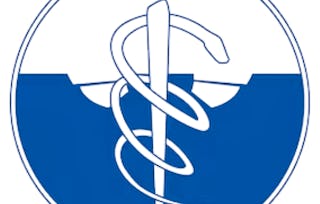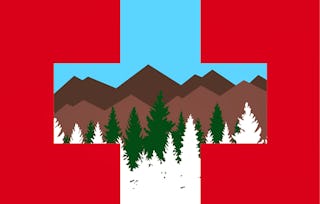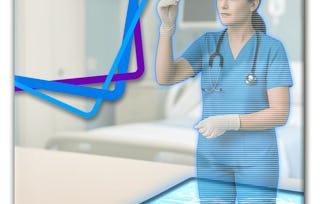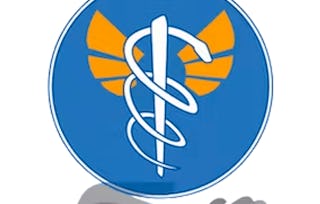In this course, you will develop the knowledge and skills to assess and stabilize certain types of patients for transport. By the end of this course, you will be able to: 1) assess a basic medical patient 2) describe general pharmacologic principles and the skills associated with medication administration, 3) explain airway physiology, the assessment of the airway and available interventions for airway management, 4) identify, assess and formulate a plan to stabilize a patient with a respiratory emergency for transport, and 5) identify, assess and formulate a plan to stabilize a patient with a cardiovascular emergency for transport. 6) describe the most common neurologic and endocrine emergencies and what you can do for them as an EMT.

Ends soon: Gain next-level skills with Coursera Plus for $199 (regularly $399). Save now.

Medical Emergencies: Airway, Breathing, and Circulation
This course is part of Become an EMT Specialization



Instructors: Angela Wright, MD
44,468 already enrolled
Included with
(812 reviews)
Skills you'll gain
Details to know

Add to your LinkedIn profile
8 assignments
See how employees at top companies are mastering in-demand skills

Build your subject-matter expertise
- Learn new concepts from industry experts
- Gain a foundational understanding of a subject or tool
- Develop job-relevant skills with hands-on projects
- Earn a shareable career certificate

There are 5 modules in this course
At the end of this module, you will be able to: 1) apply a systematic approach of patient assessment specifically to a patient with a medical complaint, 2) explain the basic principles of pharmacology including forms of medications, routes of medication administration, and to define the basic components of a drug profile and, 3) organize the appropriate steps when administering any medication including the five rights, premedication evaluation and post administration evaluation.
What's included
9 videos5 readings2 assignments1 discussion prompt
Assessment of and management of the airway is critical in patient care. This module is all about the airway. In this module you will 1) identify the most important anatomic and physiologic portions of the respiratory system, 2) distinguish between normal and abnormal in the setting of airway and breathing 3) learn how and when to use the various tools you will have as an EMT to stabilize or improve the respiratory conditions in diverse patients.
What's included
14 videos5 readings1 assignment
In this module, we will dig a little deeper into the respiratory system now that you have an overview of how this system works and its importance. By the end of this module you will 1) start to classify types of symptoms and triage them on scene 2) distinguish between an upper and lower airway issues 3) Develop the framework to assess acute and chronic respiratory diseases. 4) Work through the primary and secondary surveys you will perform when faced with a patient with many different respiratory complaints.
What's included
10 videos3 readings1 assignment
In this module we cover a system closely related to the respiratory system- the cardiovascular system. In this module you will learn 1) the intricacies of the anatomy and physiology of the cardiovascular system. 2) a few of the most common diseases that affect the cardiovascular system 3) how to approach and assess patients with cardiac complaints with an emphasis on patients with possible acute coronary syndromes 4) the differences in treatment for various cardiac complaints.
What's included
13 videos2 readings2 assignments
This module encompasses the neurological and endocrine systems. While these may not initially sound related, in this module you will learn how to assess patients with altered mental status and primary neurological complaints. To get to that point, you will: 1) learn the anatomy and physiology of the nervous system and the endocrine system. 2) learn about specific diseases or symptoms of diseases that affect the brain and mental status of a patient. 3) apply this background knowledge to the completing the primary and secondary assessments of a patients with stroke like symptoms, headaches, seizures and with altered mental status.
What's included
11 videos3 readings2 assignments
Earn a career certificate
Add this credential to your LinkedIn profile, resume, or CV. Share it on social media and in your performance review.
Instructors


Offered by
Explore more from Patient Care
 Status: Free Trial
Status: Free TrialUniversity of Colorado System
 Status: Free Trial
Status: Free TrialUniversity of Colorado System
 Status: Free Trial
Status: Free Trial Status: Free Trial
Status: Free TrialUniversity of Colorado System
Why people choose Coursera for their career




Learner reviews
812 reviews
- 5 stars
82.38%
- 4 stars
13.79%
- 3 stars
2.33%
- 2 stars
0.61%
- 1 star
0.86%
Showing 3 of 812
Reviewed on Jul 12, 2020
It was very helpful and beneficial with easy way in presenting the information.thank you all, and special thanks to Elli Smith I have a crush on you :D
Reviewed on Oct 10, 2020
This course was very informative. I learned alot. I am very Thankful for this oppourtunity to gain more knowledge about Medical Emergencies. .
Reviewed on Jun 28, 2020
Excellent course on the absolute basics. Would highly recommend for anyone who wants to learn about managing medical emergencies in the healthcare field. Videos are short but informative.
Frequently asked questions
IMPORTANT NOTICE: Current “Become an EMT” Specialization No Longer NREMT Eligible
Effective immediately, the current version of the “Become an EMT” specialization does NOT meet the National Registry of Emergency Medical Technicians (NREMT) certification requirements and cannot be used to qualify for NREMT examination.
Why This Change?
The current specialization no longer aligns with the new certification standards implemented by the NREMT in 2024. While the existing “Become an EMT” specialization remains valuable for those interested in learning about emergency medical services, it cannot be used for NREMT certification purposes.
New NREMT-Eligible Course Coming Spring 2026
A completely updated “Become an EMT” specialization that will meet all current NREMT requirements will be available on Coursera in spring 2026.
Requirements for NREMT Certification with New Course:
1. Successful completion of the online course content
AND
2. Successful completion of a hands-on skills course from a recognized EMT training center
Both components must be completed to be eligible for the NREMT examination and certification.
Currently Enrolled Learners
If you are currently enrolled in the “Become an EMT” specialization and need NREMT certification we suggest pausing your participation until the new specialization launches in spring 2026. What you have learned will help you through the new course more quickly and easily. However, partial completion of the existing course will not translate to partial completion of the new course.
Send questions to: uchmedic@uchealth.org.
Prospective Learners
If you are considering enrollment in the “Become an EMT” specialization:
• The current version of the specialization is notsuitable for NREMT certification
• The recommendation is to wait for the new NREMT-eligible version launching in spring 2026
The current course is valuable for:
• General EMS education and knowledge
• Career exploration in emergency medical services
• Continuing education for current healthcare professionals
Send questions to:uchmedic@uchealth.org.
To access the course materials, assignments and to earn a Certificate, you will need to purchase the Certificate experience when you enroll in a course. You can try a Free Trial instead, or apply for Financial Aid. The course may offer 'Full Course, No Certificate' instead. This option lets you see all course materials, submit required assessments, and get a final grade. This also means that you will not be able to purchase a Certificate experience.
When you enroll in the course, you get access to all of the courses in the Specialization, and you earn a certificate when you complete the work. Your electronic Certificate will be added to your Accomplishments page - from there, you can print your Certificate or add it to your LinkedIn profile.
More questions
Financial aid available,






